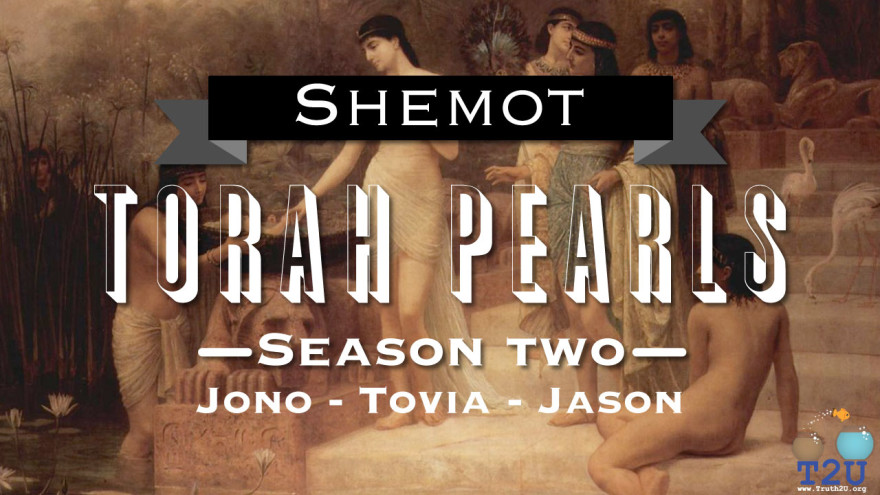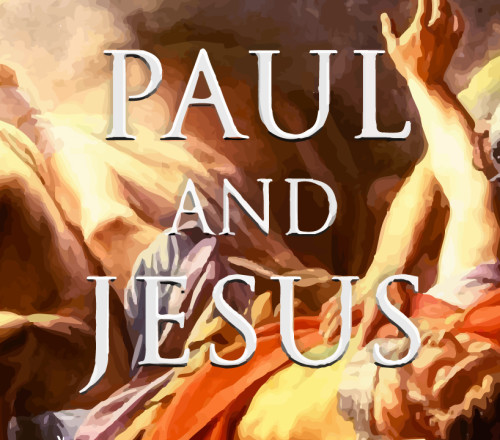Torah Pearls – Season 2 – Shemot – Rabbi Tovia Singer, Jono & Jason
Why do Christian bibles translate and capitalize Exodus 3:14 as “I AM”? Find out the answer to this and many other questions in this week’s Torah Pearls!
Bridegroom of Blood – Rabbi Tovia Singer






Shalom, I really enjoy your programs and the truth nuggets that I am able to glean. I do have a question though…wondering why you spend so much time and so many programs ridiculing Christianity. As believers in Yeshua, the Jewish Messiah, we also have some major differences with Christianity and the different translations into English. We put a lot of time into studying Biblical Hebrew, attempting to understand what is being said and the patterns that run throughout Scripture. We also learn from the rabbis and treasure them as teachers. My husband and I spend two to three months out of the year in Israel at a kibbutz, working together with Jews, befriending them, learning from them, and blessing them as much as we can (we are not attempting to convert anyone). We visit and take gifts to them in Samaria, Hevron, near Gaza, etc. With that said, after this current program, I wanted to let you know that the words that rolled off your tongue this week were often hurtful and sarcastic. I felt thrown in a box called Christianity, which apparently according to your view, is of one thought and one immature belief system. My Messiah is Jewish, does not replace anyone or anything and only supports the Hebrew Scriptures. Yes, He has been misrepresented by Christianity. Still the Mighty One of Israel is still in control and will guide all those seeking Him into His truth. Be blessed.
Thank you for doing these shows, they have taught me so much. I have a question about Moses, though. When he talked about Moses asking what God’s name was, what did it matter what God’s name was? Why would the people believe Moses based simply on a name? How could a name convince someone? It doesn’t make sense that “I am has sent me to you” is his name, as the Christians say. It seems that it is actions that prove who God is.There are a lot of people who “call” themselves Jason, doesn’t mean that every person is our Jason. We know Jason by his shepardy, farmerdy things. 😉 So, was God saying to Moses, Just wait and see?? If this is the case, then how would anyone believe Moses before anything took place? It seems that even Moses didn’t quite believe God, either. Which is unimaginable since he saw the bush that wasn’t consumed? I totally did look up these verses (Deut. 31 and Exodus) and saw in the Hebrew. Rabbi Tovia, you are so funny about the King James using high voltage capital letters.
Yes, as an ex-Christian we are very scarred. This scarring causes us to question every single thing we hear and see. I personally am going through every thing I have ever learned since I was a Christian for 35 years. I am still recovering, But, I believe God and know that when I prayed and asked God to show me the truth, that he would be faithful and he would be there to go through it with me.
Anyway, I am so blessed by all of you every week, I look forward to learning more.
You guys have too much fun, wish I was there 😮
I saw the “Exodus” movie, and half-way through felt the desire to make my own personal exodus out of the theatre… Unfortunately I went with a lady-friend who is a Christian Bale fan, so I had to gut it out. She told me after the ordeal was over that she had fallen asleep for periods of the movie, which made me even more regretful for not walking out 😉
Nevermind all the inaccuracies, the whole thing is just a bad FILM. Poorly acted, written, visualized and executed. It fails on pretty much every conceivable level that makes a movie even remotely entertaining, realistic, or engaging. Just avoid it like the 10 REAL plagues, and your life will be better off for it.
Tovia’s right, the book was better 🙂
G’day! Two questions: (1) When it says a certain Levite man married a certain Levite woman and they had a child, it does not mention Aaron and Miryam. Were they Moses’ half brother and sister? Or was it just not important to mention here? (2) Also, if tradition says Moses spoke the Name of Hashem to the Egyptian man who died as a result, how did Moses know the name of Hashem if He only revealed His Name to Moses years later in Ex 33:19 when Moses was standing in the cleft of the rock?
Ida from the way I heard the story, Moses mom and dad had already been married, they had to separate because of the decree to kill the first born. but Miryam talked them into getting back together, saying that they are depriving them another daughter.
That is all extra Biblical and I think it may be in the Talmud, but I’m not sure about that.
Joel, yes I heard that explanation a few days before I asked the question. But I’d love to hear Tovia’s textual answer 🙂
I have enjoyed these programs, and eagerly look forward to them every week! I’m always hoping to have my beliefs challenged and/or reinforced. In the never ending pursuit for truth, I continue to listen, read, learn, and grow.
Tovia has such an incredible grasp of the Tanach. It is always an adventure tio listen when he is teaching. Sadly, I nearly turned him off. I enjoy joking around and having fun, but to make fun of people, saying they are drug users or alcoholics is NOT godly humor. I believe it could be viewed as Lashon Hara (sp?). Any attack on another’s character should be avoided…remember Miriam!
With that said, please continue to teach, find those hidden pearls we are all looking for, and help us, those who were lied to and lost, find out way home. I desire to grab hold of the tzi that’s of the Jew, Tovia, and not be so offended that I let go.
Shalom!
Heather, you have asked a very bright question!!! The four-letter description / name is very powerful — and it describes Him in a way that gave proof to the Israelites that Moses was indeed His messenger. It means “I am as I was as I will always be” or to put it another way “I will be as I always will be.”
In each of G-d’s names in the bible (descriptions more than names) — each one of His names is defining an action. This is what Moses was asking G-d when asking His name. Moses wasn’t asking His name as if it were Zeus or something, rather, His name was to reflect how the redemption was to take place. What “attribute” was going cause the action. In other words, did the nation of Israel “merit” the redemption, and His name would be the determining factor. This is a case where a “translation” loses every bit of its worth. The English language can’t see this at all.
In fact, Moses never actually asked G-d “What is your Name?”—look at very closely at what the Torah says:
Then Moses said to the G-d [note the use of the definite article translated as “THE” here]: “Look, [when] I come to the children of Israel and I tell them ‘Your ancestors’ G-d has sent me to you’— if they ask me what His name is, how should I answer them?” (Sh’mot / Exodus 3:13).
So Moses didn’t ask God what His “Name” is and G-d never told him (or anyone else) “My ‘Name’ is….” either.
These shows are always thought provoking and fun.
Heather, that really is a good question. I haven’t listened to the latest Pearl, so the guys might have gone over it pretty well already. Sophiee brings up a point very nicely, however. I have learned through reading, learning and listening here that names are more than just something you answer to, as Sophiee mentioned.
I wanted to know about G-d’s name last year. I kind of asked him, actually. As things work out, you sometimes sort of trip over the answer as you go through your normal routine. I was skimming a list that my better half was working with of Hebrew words and definitions. I noticed a word popping out in the Hebrew that most of us probably don’t notice because it is changed so much in the English. I wish I still had a copy of the list.
Some of the words were “Hezekiah”, “Elijah”, “Jews”…
Now in English, “Je”, “iah” and “jah” have nothing in common, but when you go over to the Hebrew, they say יהודי , אליה , חזקיה . They were translated as…
חזקיה Hzk’yah G-d is Powerful
אליה El’ee’Yah G-d is god
יהודי Yah’oo’dee Belonging to G-d (Jews)
I realized three things after reading the list. First, these are not just names, they are more like sentences. Second, every time the translation mentioned “G-d”, then the letters יה (yah) also appeared. Third, the Jews are a people called by his name. Something just clicked. I remembered David using both יהוה and יה to refer to his god in the Psalms and being a little confused. So I wondered, perhaps if יהוה is also like a sentence.
Quite a bit of time passed and a Proto-Sinaitic script was brought to my attention. Proto-Sinaitic is an earlier version of Hebrew that is made of pictures, much like Egypt’s Hieroglyphs. While it was interesting, I don’t think anyone I researched has an understanding of it at 100% yet. The way that יהוה is often translated, pictorially, just felt off.
What did seem on, however, is that some letters do have word names…
It’s hard for our English brains (or at least mine) to get our minds wrapped around it, but each of these Hebrew letters does stand for a whole word. To break up יהוה is Y’d, H’y, V’v, H’y.
יד (Y’d) means a “hand”,
הי (H’y) means “to exist” “to be” or “the”,
וו (V’v) is “hook”, “peg”, “connector”, “attach”
In today’s Hebrew, each of those letters is also a prefix/suffix translated as י “do”, ה “the” and ו “and”
So in summary, your question was “When he talked about Moses asking what God’s name was, what did it matter what God’s name was?” Because, as Sophiee said, it is a description of who he is…
I am still learning, but it is my understanding, so far, that יהוה means
“The one who DOES EXISTENCE and HOOKS EXISTENCE” … or he is telling Moses “I am the one who made everything and I am the one who holds it together”.
The question of the Christian bible translation of Ex 3:14 as “I AM”, whereas the Hebrew is actually, “I will be” is fascinating, and extremely important. Tovia noted that mistranslating it this way has Exodus support John 8:58, in which Jesus famously declares that “before Abraham was born, I am!”. I think there’s more to it.
The implication is that Christians purposefully mistranslated Ex 3:14 to meet their ends, however I believe the explanation is different. If you look back at the history of the Septuagint, which was the Greek translation of the Hebrew bible, you will find that the the translation of the first books of the Torah were completed in either the 2nd or 3rd century BC. What is important about this is that the Greek writers of the Christian scriptures (and indeed a good percentage of non-Hebrew reading Jews) relied on the Septuagint translation. And in the Septuagint, the Greek translation of Ex. 3:14 is in fact, “I am”.
What I’m suggesting here is that later Christian translations of the bible didn’t change Ex. 3:14 to support John 8:58 — It was already translated that way in the scriptures they depended on. Now, they may have tweaked it by capitalizing “I AM”, but they didn’t purposefully mistranslate it. Does that mean they’re off the hook? I think perhaps the bible translators are, but the Christian scriptures are certainly not.
If — as Christian leaders, scholars and textbooks declare — Jesus was referring to himself by God’s name or in the same way God referred to Himself in Ex 3:14 when he said “I am” in John 8:58, then we must necessarily see that Jesus, as God, didn’t get his own name right! The Greek John is very clearly “I am”, in the present tense. If Jesus really was God incarnate, you can be sure that he would have referred to himself as “I will be”, not “I am”. God would have gotten His name right in Hebrew, Greek, Aramaic and any other language He may have used. So Greek vs Hebrew or not, clearly he got it wrong in the Christian scriptures.
There is only one other possible explanation, and that is that Jesus was not referring to Ex 3:14 when he said “I am”, but simply that he was stating that he was eternal. There are many problems with that explanation, not the least of which is the conclusion that all the Christian pastors, scholars, texts and bible commentaries that have insisted that “I am” referred back to Ex 3:14 are clearly and unquestionably wrong. And if they are wrong on this, then what else are they wrong about, and can their opinions really be trusted after making such a significant blunder?
Either way, Christianity is stuck in a corner on this one.